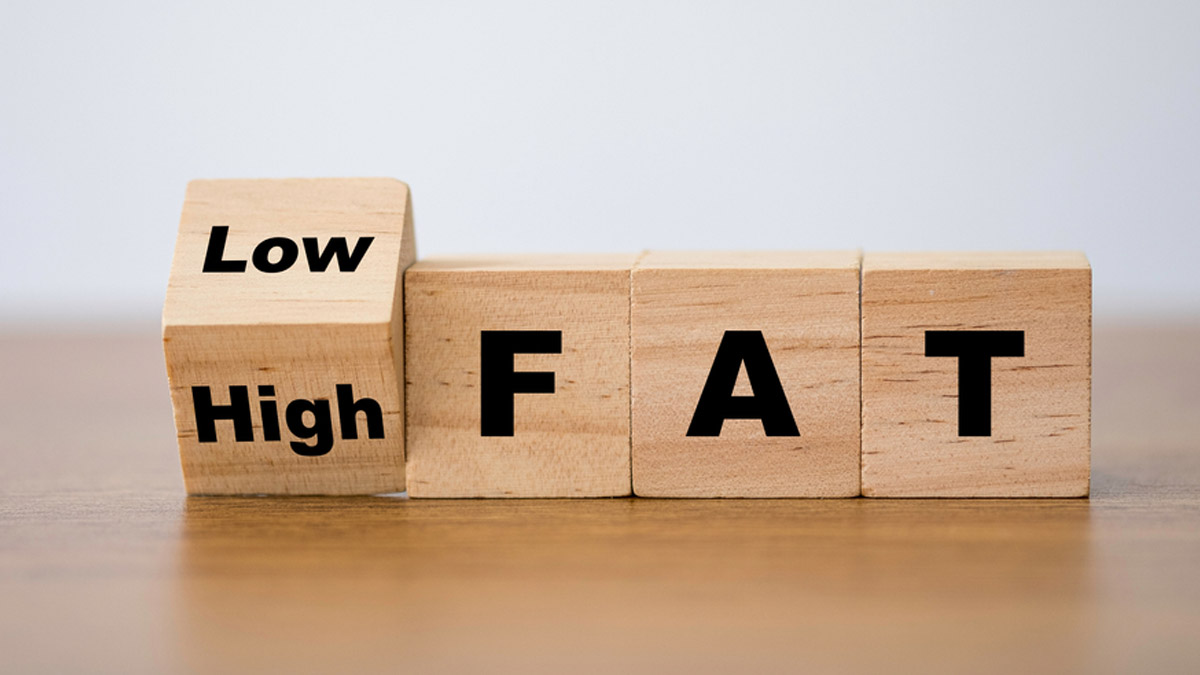
If you are a health enthusiast, you must have heard about the words ‘low-fat’ and ‘fat-free’. While they may sound straightforward, however, their role extends beyond its literal meaning. It is important to understand these terms in detail to make informed health choices. We spoke to Dr Ekta Singhwal, MSc Dietician, Ujala Cygnus Group of Hospitals, who explained these food labels, their benefits and things to consider.
Table of Content:-
What Is Low-Fat

When a product is labelled as ‘low-fat’, it indicates that the food contains a reduced amount of fat compared to its standard version. According to the data published in the American Cancer Society, the term ‘low-fat’ means that the product contains three grams or less of fat per serving.
Benefits of Choosing Low-Fat
Dr Singhal listed the benefits of choosing low-fat food as follows:

- Calorie Reduction: Fat is more calorie-dense than carbohydrates or proteins. Opting for low-fat options can contribute to overall calorie reduction, beneficial for weight management.
- Heart Health: Lowering saturated and trans fat intake is linked to heart health. Choosing low-fat options can be a step towards reducing the risk of cardiovascular diseases.
- Dietary Guidelines: Many dietary guidelines recommend limiting the intake of saturated fats, and opting for low-fat choices aligns with these recommendations.
Considerations With Low-Fat
Dr Singhal listed some important considerations to keep in mind:
- Added Sugars: To compensate for reduced fat content, some low-fat products may contain higher levels of added sugars or artificial additives for flavour. It's essential to check the overall nutritional profile.
- Satiety: Fat contributes to a feeling of fullness. Choosing low-fat options might leave some individuals feeling less satisfied, potentially leading to increased calorie consumption later.
Also Read: What Happens When Your Body Gets More Energy From Fats? Know The Symptoms Of Ketosis
What Is Fat-Free

On the other end of the spectrum is the term ‘fat-free’. As per the information in the American Cancer Society, when a product is labelled as 'fat-free’, it means that the food contains less than 0.5 grams of fat per serving. It's crucial to note that ‘fat-free’ does not equate to calorie-free or devoid of other potentially less healthy ingredients.
Benefits of Choosing Fat-Free
Fat-free food have multiple benefits, some of them listed by the expert are as follows:
- Calorie Reduction: Similar to low-fat options, choosing fat-free products can contribute to calorie reduction, which may be beneficial for those aiming to manage their weight.
- Dietary Restrictions: Individuals with dietary restrictions or preferences that limit fat intake can find fat-free options suitable for their needs.
Considerations with Fat-Free
- Nutrient Absorption: Certain fat-soluble vitamins (A, D, E, and K) require fat for proper absorption. Relying solely on fat-free options may impact the absorption of these essential nutrients.
- Added Ingredients: Some fat-free products may contain added sugars, salt, or preservatives to enhance flavour. Checking the overall nutritional content is crucial.
Also Read: Healthy Fats For Heart Health: Foods You Can Add To Your Diet
Understanding the Food Labels

- Read the Nutrition Facts Label: Understanding the nutritional content beyond just fat is crucial. Pay attention to added sugars, sodium, and overall calorie content.
- Consider Whole Foods: Instead of relying solely on processed low-fat or fat-free products, incorporate whole foods into your diet. Whole fruits, vegetables, lean proteins, and whole grains offer a range of nutrients without excessive processing.
- Balanced Approach: Instead of focusing solely on fat content, strive for a balanced diet. Provide your body with essential vitamins, minerals, and other compounds by eating nutrient-dense foods.
Bottomline
Dr Singhal concluded, “While opting for low-fat or fat-free options can be beneficial, it's equally crucial to consider the overall nutritional profile and potential trade-offs in terms of added sugars or other additives.”
[Disclaimer: This article contains information provided by a registered healthcare professional and is for informational purposes only. Hence, we advise you to consult your expert before making any changes to your diet, especially if you are dealing with any health conditions.]
Also watch this video
How we keep this article up to date:
We work with experts and keep a close eye on the latest in health and wellness. Whenever there is a new research or helpful information, we update our articles with accurate and useful advice.
Current Version